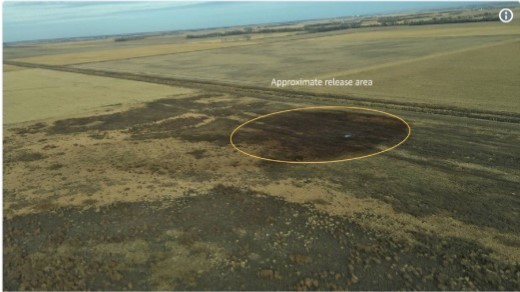By Nina De Almeida Souza, University of Saskatchewan Student
A pipeline is a system of connected pipes that transport liquid or gases to enable the displacement of a product from the producer to the consumer market. Because of the risks of this operation and advantages of this sort of transport to the Canadian economy, a discussion has arisen around the expansion of pipelines, including the flow and maintenance of the productive capacity of the Canadian lands.

First of all, there are many reasons that raise concerns about both building and operating a pipeline over agricultural lands. Pipelines can be dangerous for soil quality. According to Bennett (2017), the main concerns about pipeline option are soil health, drainage issues, and the time of emergency response from oil and gas companies. Some of the consequences, especially during the wet season, is, due to heavy farm machinery, the land accessibility to proceed with farming in the field can become extremely difficult, and also the changes in soil fertility and deposition. Another point is the pipeline construction can cause an extensive disturbance in the ecologic system not only because of the clearance of vegetation, ground excavation, and soil compaction but also because of soil heavy metal contamination (Shi et al, 2014). Pipelines increase the probability of harming public health due to the toxicity of heavy metals accumulated in the aquatic organisms. In addition, Halmová and Feher (2014) found in their study a significant increase in the temperature above pipelines and a reduction in the soil moisture. Lastly, soil contamination from leaking under the surface has already occurred in Keystone Pipeline, South Dakota (Cuevas et al, 2017). Even though the operation of pipelines is licensed by the Pipeline Act (2000) and regulated by the National Energy Board (NEB), potential leaks can reach waterways, water system, and wildlife. Also, the repair process would harm the soil structure. So, contamination and structural soil problems are the main worries of soil problems caused by pipelines according to the Keystone’s opponents.
However, on the opposite side of pipeline construction and operation, there are some positive aspects that have to be considerate. First, the business of pipelines can increase the employment level and GDP of the country. Based on data from the website About Pipelines, 34,000 full-time jobs were created in Canada, creating household’s income of $2.9 billion, and adding $11.5 billion to Canadian GDP in 2015. Second, according to Briere et al (2018) pipelines would increase significantly the capacity of oil transportation, allowing a production boost in this sector by facilitating its availability to the international markets through the west coast, and decreasing the competition with Prairie farmers’ production. Briere et al said “the Trans Mountain pipeline is vital to the economies of Alberta, the Prairies, and the nation. It is unacceptable to see Alberta’s economic potential restricted because we cannot figure out how to move crude.” Another point to consider in the words of Natural Resources Canada (2016) is that “pipelines are a safe, reliable and environmentally friendly way of transporting oil and gas”, mainly because of the computerized system that keeps all operational conditions continuously monitored in addition to periodic tests (Reeves and Ryan, 2018). Economics and new technology are the main reasons to stand in favor of the creation and expansion of pipelines.
To conclude, even though society urges for a cleaner energy source, the modern world is still dependent on oil and its derivatives to work. In this way, Canada has a huge potential to develop its economy in a solid way by expanding the pipelines already in place. This expansion could increase Canada`s trade power and raise the international price of Canadian oil. Since all citizens want to enjoy the benefits of modern life, a focused pressure over the environmental and license regulations and policies should be done in order to guarantee the improvement of the life’s quality without a loss of the soil productive capacity and a healthy environment for the current and future generations.
[su_accordion][su_spoiler title=”References” open=”no” style=”default” icon=”plus” anchor=”” class=””][su_list icon=”icon: check” icon_color=”#47907C”]
- Bennett, Chris (2017). Pipelines and farmers battle over lifetime loss. Farm journal. Available in: https://www.agweb.com/article/pipelines-and-farmers-battle-over-lifetime-loss-naa-chris-bennett/
- Briere, Karen; Dyck, Bruce; Glen, Barb; MacLeod, Brian, and Raine, Michael. Farmers depend on Ottawa to clean up pipeline mess. (2018, September 6). In The Western Producer. Retrieved November 10, 2018, from https://www.producer.com/2018/09/farmers-depend-on-ottawa-to-clean-up-pipeline-mess/
- Cuevas, Mayra; Almasy, Steve (2017). Keystone Pipeline leaks 210,000 gallons of oil in South Dakota. CNN. Retrieved November 10, 2018, from https://www.cnn.com/2017/11/16/us/keystone-pipeline-leak/index.html
- Halmová, Daniela; Feher, Alexander (2014). Effect of transit gas pipeline temperature on the production potential of agricultural soils. Journal of Central European Agriculture. 15(3), p. 245-253.
- Reeves, Andrew, and J.t Ryan. Pipelines in Canada (2018, September 11). The Canadian Encyclopedia. Retrieved November 10, 2018, from https://www.thecanadianencyclopedia.ca/en/article/pipeline
- Shi, Peng; Xiao, Jun; Wang, Yafeng; Chen, Liding (2014). Assessment of Ecological and Human Health Risks of Heavy Metal Contamination in Agriculture Soils Disturbed by Pipeline Construction. Int J Environ Res Public Health; 11(3): 2504–2520.
[/su_list] [/su_spoiler][/su_accordion]

Nina De Almeida Souza
Nina, is a biologist graduate from Brazil, where she also got her Master degree in Environmental Geochemistry. Since her graduation, she has accumulated 15 years of experience in environmental quality assessment, especially of water bodies under industrial areas` influence. Currently, Nina is enrolled in the Agribusiness degree at #USASK.

